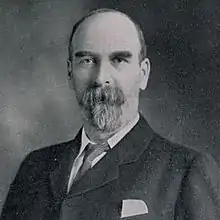John Johnson (British politician)
John Johnson (1850 – 29 December 1910) was a British trade unionist and Lib-Lab politician.

Trade Unionist
He worked in the mining industry. In 1890 he became Treasurer of the Durham Miners' Association and then in 1897 their Financial Secretary.
Politician
In 1904, following the death of the Gateshead Liberal MP, William Allan, Johnson, though a member of the Independent Labour Party, was selected as Liberal candidate to defend the predominantly mining seat at a by-election. He won the election and joined the Liberal-Labour trade union group, as a miners union sponsored MP.
In 1906 he was re-elected at the General Election.
| Party | Candidate | Votes | % | ±% | |
|---|---|---|---|---|---|
| Liberal | John Johnson | 9,651 | 65.3 | ||
| Liberal Unionist | Sir Theodore Vivian Samuel Angier | 5,126 | 34.7 | ||
| Majority | 4,525 | 30.6 | |||
| Turnout | 79.4 | ||||
| Liberal hold | Swing | ||||
In 1909, when the Miners Federation of Great Britain affiliated to the Labour party he was required to cross the floor to sit as a Labour MP. He was also required to seek re-election at the next General election as a Labour candidate.
In 1910, he contested the January General Election as a Labour candidate but was opposed by a Liberal candidate, Harold Elverston. Johnson was a supporter of the Miners Eight Hours Act, which brought him opposition from many miners in Gateshead.[1] Johnson finished in third place as the Liberals re-gained the seat.
| Party | Candidate | Votes | % | ±% | |
|---|---|---|---|---|---|
| Liberal | Harold Elverston | 6,800 | 40.7 | +40.7 | |
| Liberal Unionist | Nicholas Grattan-Doyle | 6,323 | 37.9 | +3.2 | |
| Labour | John Johnson | 3,572 | 21.4 | -43.9 | |
| Majority | 477 | 2.8 | |||
| Turnout | 87.2 | +7.8 | |||
| Liberal gain from Labour | Swing | +42.3 | |||
He died in December 1910 at the age of 60 in Durham, England.[2]
References
- A Liberal Chronicle – Journals and Papers of J.A.Pease, 1908–1910
- John Johnson - LifeStory